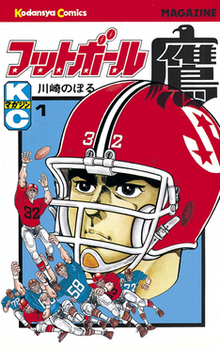Football Hawk
| Football Hawk | |
 First tankōbon volume cover | |
| フットボール鷹 (Futtobōru Taka) | |
|---|---|
| Genre | Sports[1] |
| Manga | |
| Written by | Noboru Kawasaki |
| Published by | Kodansha |
| Magazine | Weekly Shōnen Magazine |
| Demographic | Shōnen |
| Original run | January 9, 1977 – April 1, 1979 |
| Volumes | 10 |
Football Hawk (Japanese: フットボール鷹, Hepburn: Futtobōru Taka) is a Japanese manga series written and illustrated by Noboru Kawasaki. It was serialized in Kodansha's Weekly Shōnen Magazine from January 1977 to April 1979 and published in ten volumes.
Media[edit]
Manga[edit]
Written and illustrated by Noboru Kawasaki, the series began serialization in serialization in Kodansha's manga magazine Weekly Shōnen Magazine on January 9, 1977.[2] It completed its serialization on April 1, 1979.[3] Its individual chapters were collected into ten tankōbon volumes.[4]
Volumes[edit]
| No. | Japanese release date | Japanese ISBN |
|---|---|---|
| 1 | July 26, 1978[5] | 978-4-06-109483-3 |
| 2 | July 26, 1978[6] | 978-4-06-109484-0 |
| 3 | August 18, 1978[7] | 978-4-06-172516-4 |
| 4 | September 21, 1978[8] | 978-4-06-172520-1 |
| 5 | October 20, 1978[9] | 978-4-06-172526-3 |
| 6 | December 19, 1978[10] | 978-4-06-172551-5 |
| 7 | January 23, 1979[11] | 978-4-06-172560-7 |
| 8 | February 22, 1979[12] | 978-4-06-172566-9 |
| 9 | March 23, 1979[13] | 978-4-06-172571-3 |
| 10 | April 20, 1979[4] | 978-4-06-172578-2 |
Audio drama[edit]
An audio drama adaptation, with scripts written by Mamoru Sasaki and starring Kinya Aikawa, was released by NHK FM Broadcast. It ran for six episodes from August 14–19, 1977.[14]
Reception[edit]
In 1978, the series won the 2nd Kodansha Manga Award in the shōnen manga category.[15]
Mike Toole of Anime News Network felt that the story was not as melodramatic as Ikki Kajiwara's Ashita e Free Kick, but that it was well researched and had good artwork. He concluded that "Football Hawk would be the most successful stab at [American football]'s depiction in manga for quite some time".[1]
References[edit]
- ^ a b Toole, Mike (February 4, 2019). "The Mike Toole Show Anime in the End Zone". Anime News Network. Archived from the original on January 12, 2024. Retrieved January 11, 2023.
- ^ 週刊少年マガジン 1977年 表示号数2. Media Arts Database (in Japanese). Agency for Cultural Affairs. Archived from the original on January 12, 2024. Retrieved January 11, 2024.
- ^ 週刊少年マガジン 1979年 表示号数14. Media Arts Database (in Japanese). Agency for Cultural Affairs. Archived from the original on January 12, 2024. Retrieved January 11, 2024.
- ^ a b フットボール鷹(10) (in Japanese). Kodansha. Archived from the original on January 12, 2024. Retrieved January 11, 2024.
- ^ フットボール鷹(1) (in Japanese). Kodansha. Archived from the original on January 12, 2024. Retrieved January 11, 2024.
- ^ フットボール鷹(2) (in Japanese). Kodansha. Archived from the original on January 12, 2024. Retrieved January 11, 2024.
- ^ フットボール鷹(3) (in Japanese). Kodansha. Archived from the original on January 12, 2024. Retrieved January 11, 2024.
- ^ フットボール鷹(4) (in Japanese). Kodansha. Archived from the original on January 12, 2024. Retrieved January 11, 2024.
- ^ フットボール鷹(5) (in Japanese). Kodansha. Archived from the original on January 12, 2024. Retrieved January 11, 2024.
- ^ フットボール鷹(6) (in Japanese). Kodansha. Archived from the original on January 12, 2024. Retrieved January 11, 2024.
- ^ フットボール鷹(7) (in Japanese). Kodansha. Archived from the original on January 12, 2024. Retrieved January 11, 2024.
- ^ フットボール鷹(8) (in Japanese). Kodansha. Archived from the original on January 12, 2024. Retrieved January 11, 2024.
- ^ フットボール鷹(9) (in Japanese). Kodansha. Archived from the original on January 12, 2024. Retrieved January 11, 2024.
- ^ フットボール鷹. The Script Database (in Japanese). Agency for Cultural Affairs. Archived from the original on January 12, 2024. Retrieved January 11, 2024.
- ^ フットボール鷹. Mangapedia (in Japanese). Archived from the original on January 12, 2024. Retrieved January 11, 2024.
